Chuan Cui
M3-AGIQA: Multimodal, Multi-Round, Multi-Aspect AI-Generated Image Quality Assessment
Feb 21, 2025Abstract:The rapid advancement of AI-generated image (AGI) models has introduced significant challenges in evaluating their quality, which requires considering multiple dimensions such as perceptual quality, prompt correspondence, and authenticity. To address these challenges, we propose M3-AGIQA, a comprehensive framework for AGI quality assessment that is Multimodal, Multi-Round, and Multi-Aspect. Our approach leverages the capabilities of Multimodal Large Language Models (MLLMs) as joint text and image encoders and distills advanced captioning capabilities from online MLLMs into a local model via Low-Rank Adaptation (LoRA) fine-tuning. The framework includes a structured multi-round evaluation mechanism, where intermediate image descriptions are generated to provide deeper insights into the quality, correspondence, and authenticity aspects. To align predictions with human perceptual judgments, a predictor constructed by an xLSTM and a regression head is incorporated to process sequential logits and predict Mean Opinion Scores (MOSs). Extensive experiments conducted on multiple benchmark datasets demonstrate that M3-AGIQA achieves state-of-the-art performance, effectively capturing nuanced aspects of AGI quality. Furthermore, cross-dataset validation confirms its strong generalizability. The code is available at https://github.com/strawhatboy/M3-AGIQA.
Text2Bundle: Towards Personalized Query-based Bundle Generation
Oct 27, 2023



Abstract:Bundle generation aims to provide a bundle of items for the user, and has been widely studied and applied on online service platforms. Existing bundle generation methods mainly utilized user's preference from historical interactions in common recommendation paradigm, and ignored the potential textual query which is user's current explicit intention. There can be a scenario in which a user proactively queries a bundle with some natural language description, the system should be able to generate a bundle that exactly matches the user's intention through the user's query and preferences. In this work, we define this user-friendly scenario as Query-based Bundle Generation task and propose a novel framework Text2Bundle that leverages both the user's short-term interests from the query and the user's long-term preferences from the historical interactions. Our framework consists of three modules: (1) a query interest extractor that mines the user's fine-grained interests from the query; (2) a unified state encoder that learns the current bundle context state and the user's preferences based on historical interaction and current query; and (3) a bundle generator that generates personalized and complementary bundles using a reinforcement learning with specifically designed rewards. We conduct extensive experiments on three real-world datasets and demonstrate the effectiveness of our framework compared with several state-of-the-art methods.
Towards Multi-Subsession Conversational Recommendation
Oct 20, 2023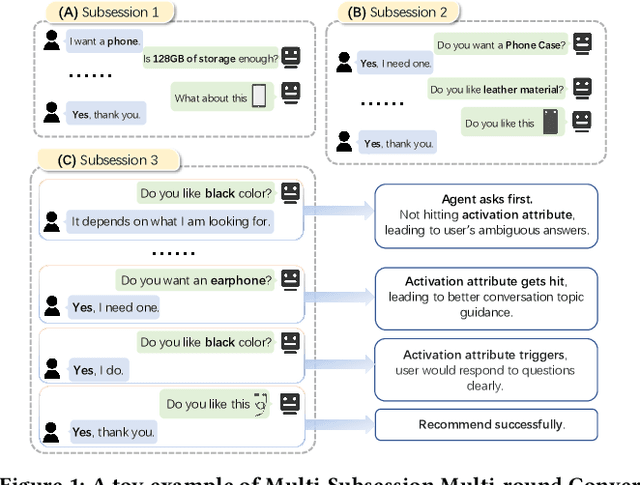

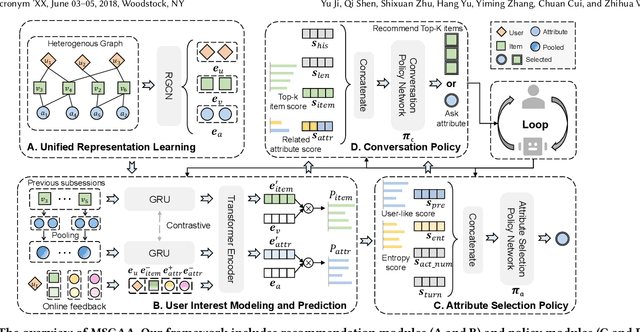

Abstract:Conversational recommendation systems (CRS) could acquire dynamic user preferences towards desired items through multi-round interactive dialogue. Previous CRS mainly focuses on the single conversation (subsession) that user quits after a successful recommendation, neglecting the common scenario where user has multiple conversations (multi-subsession) over a short period. Therefore, we propose a novel conversational recommendation scenario named Multi-Subsession Multi-round Conversational Recommendation (MSMCR), where user would still resort to CRS after several subsessions and might preserve vague interests, and system would proactively ask attributes to activate user interests in the current subsession. To fill the gap in this new CRS scenario, we devise a novel framework called Multi-Subsession Conversational Recommender with Activation Attributes (MSCAA). Specifically, we first develop a context-aware recommendation module, comprehensively modeling user interests from historical interactions, previous subsessions, and feedback in the current subsession. Furthermore, an attribute selection policy module is proposed to learn a flexible strategy for asking appropriate attributes to elicit user interests. Finally, we design a conversation policy module to manage the above two modules to decide actions between asking and recommending. Extensive experiments on four datasets verify the effectiveness of our MSCAA framework for the MSMCR setting.
Intention Adaptive Graph Neural Network for Category-aware Session-based Recommendation
Dec 31, 2021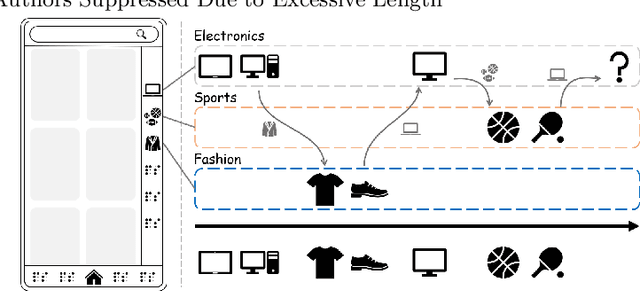
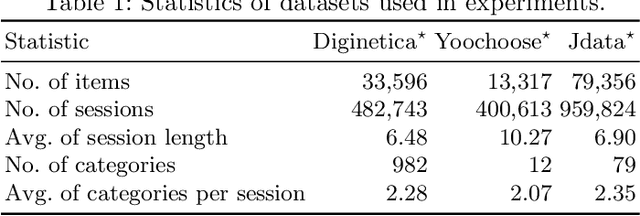
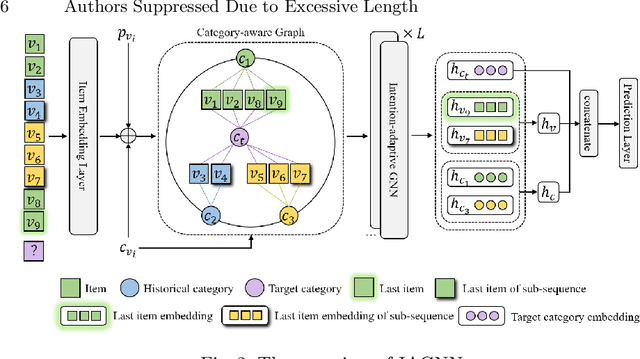
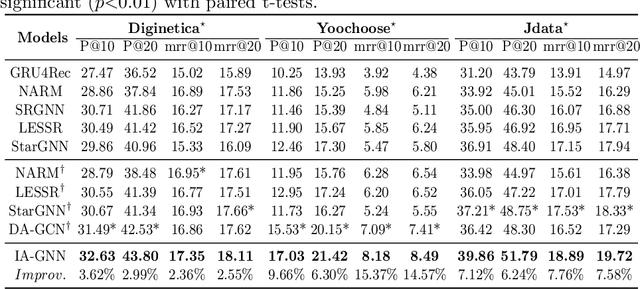
Abstract:Session-based recommendation (SBR) is proposed to recommend items within short sessions given that user profiles are invisible in various scenarios nowadays, such as e-commerce and short video recommendation. There is a common scenario that user specifies a target category of items as a global filter, however previous SBR settings mainly consider the item sequence and overlook the rich target category information in this scenario. Therefore, we define a new task called Category-aware Session-Based Recommendation (CSBR), focusing on the above scenario, in which the user-specified category can be efficiently utilized by the recommendation system. To address the challenges of the proposed task, we develop a novel method called Intention Adaptive Graph Neural Network (IAGNN), which takes advantage of relationship between items and their categories to achieve an accurate recommendation result. Specifically, we construct a category-aware graph with both item and category nodes to represent the complex transition information in the session. An intention-adaptive graph neural network on the category-aware graph is utilized to capture user intention by transferring the historical interaction information to the user-specified category domain. Extensive experiments on three real-world datasets are conducted to show our IAGNN outperforms the state-of-the-art baselines in the new task.
 Add to Chrome
Add to Chrome Add to Firefox
Add to Firefox Add to Edge
Add to Edge